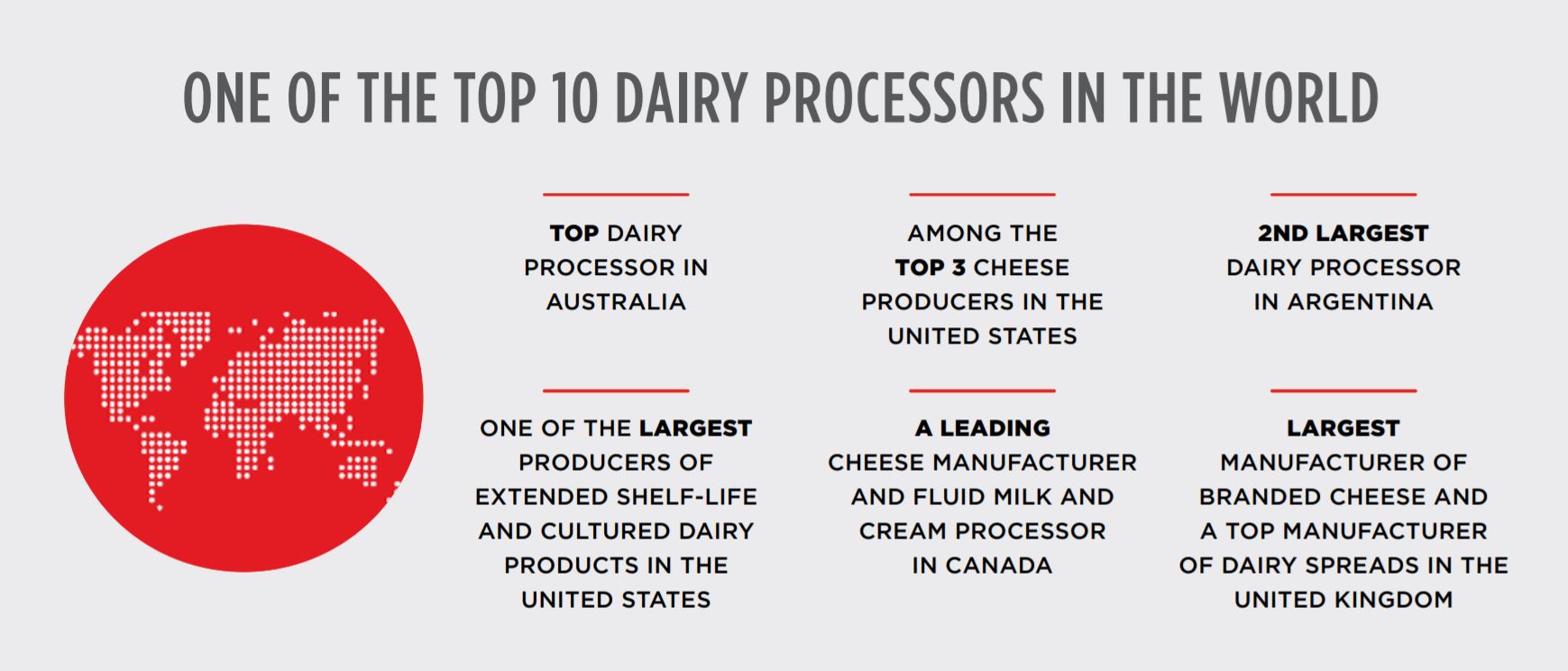Sometimes – if it’s 1954 – all you need is a bicycle and $500 in cash to “plant the seeds” of a multinational dairy company. At least, that’s how it happened for the Saputo family.
After settling in Montreal, Canada, Lino Saputo and his parents founded a small business—Saputo, Inc.—that has since exploded into one of the world’s leaders in the dairy industry and the 2020 MMPA Valued Partner award recipient.
“After modest beginnings, the company’s founders saw their determination, hard work, passion and vision transform Saputo into an industry leader, both in Canada and around the world,” said Terry Brockman, COO and President of Saputo’s Cheese Division (USA).
Today, Saputo products can be found in 50 countries under brand names like Joyya, International Delight, Frigo and Dairy Star. The company employs over 17,200 employees and operates 66 facilities worldwide, including 26 in the U.S.

They may no longer use a bicycle as the main mode of delivery, but the Saputo family is still at the helm, with Lino Saputo, Jr. serving as chair of the board of directors. Publicly traded since 1997, Saputo is one of the top 10 dairy processors in the world and among the top three cheese producers in the U.S.
Driving Growth and Innovation
Brockman says that the company has grown significantly, in part, through 32 acquisitions over the last two decades. “Saputo is to be admired for its impressive growth via acquisitions, investments in assets and innovation, and commitment to supporting the communities in which it operates,” he said.
Leaving no class untouched, Saputo makes cheeses, fluid milk, extended shelf-life milk and cream products, cultured products, dairy ingredients, and butters, spreads and oils. MMPA supplies several ingredient products for Saputo, serving both the dairy and cheese divisions of their business.
MMPA Senior Director of Sales Jim Feeney said in addition to sales of raw milk, condensed skim products and cream, MMPA has helped Saputo meet their unique needs with the ultra-filtered (UF) milk system at the Constantine plant.
“Our UF and its customization capabilities has many applications that mesh well with Saputo,” Feeney said. “We worked alongside them to explore the capabilities of the line through test runs and trials to customize what they want and what they need.”
According to Brockman, Saputo invests in innovation and is constantly exploring new projects that align with their goals and vision. This involves partnering with suppliers like MMPA on mutually beneficial products and projects.
Feeney says MMPA helps provide support to our customers like Saputo by aligning with them through the research and development process.
“We work in tandem with their research and development team to know where they want to go and how we can help them,” Feeney said. “We imagine new products not on the market today and envision how we can align to make them possible. Together, we’re driving innovation.”
“Our company prides itself on dedicated research and development. We are always on the lookout for not only new product ideas, but also best practices in the form of technology,” Brockman said.
They have an established research and development process that Brockman says has proven successful. “Our development process incorporates the following: (i) envisioning strategic opportunities through industry dynamics and key insights, (ii) examining how we can deliver on consumer needs through product ideation leveraging R&D and culinary capabilities and (iii) executing a scalable plan to commercialize effectively and efficiently,” Brockman said.
Capitalizing on Consumer Trends
In charge of Saputo’s U.S. cheese division, Brockman says they strive to stay on top of consumer’s evolving needs in this important category.
“The Cheese Division (USA) continues to review current dairy trends to understand the changing needs of consumers to ensure we are delivering the right products for today’s consumer,” Brockman said. “Across key brands, we have launched multiple product formats such as new snacking items and have continued to grow core product types.”
For example, as demand for whole milk has regenerated in recent years, Saputo’s brand Frigo Cheese Heads relaunched its “super string cheese” product with whole milk. According to Brockman, whole milk sales have been up 6 percent since 2016 compared to prior year and have continued to grow. The use of whole milk and “unique fortification” of Vitamin A & Calcium helps distinguish the Frigo product on store shelves.
“As a processor, we’re in a unique position to affect cheese making throughout the entire manufacturing process, staying ahead of ever-changing consumer taste preferences,” Brockman continued.
Looking ahead, Saputo intends to continue charging forward with strategic acquisitions, developing new product developments, and focusing on sustainability and technology. Brockman also pointed to their focus on collaboration among their employees, 6,500 of which are based in the U.S.
Focusing on Passion and Family Spirit
“Saputo’s longstanding unique and commendable culture, which embraces open dialogue and allows every employee to be heard and respected, is something that is very important to the company,” he said.
This has continued through the added challenges of the COVID-19 pandemic. Along with ensuring business continuity, Saputo zeroed in on “supporting [the] frontline.” In addition to adapting production, supporting their local communities and patron farmers, Saputo helped their employees by “mitigating financial, physical and mental health impacts,” going back to the values that guided them to the success they have today.
“Throughout our evolution, we have maintained our culture by staying focused on the values that define us,” Brockman said. “Family spirit, loyalty and passion are the cornerstones of our approach, and teamwork, continuous improvement and quality are at the heart of our every initiative.”

This article was originally published in the July/August issue of the Milk Messenger. Subscribe »

